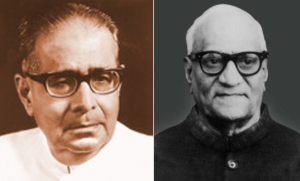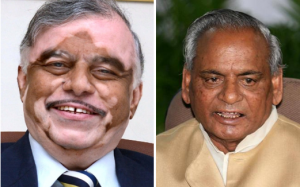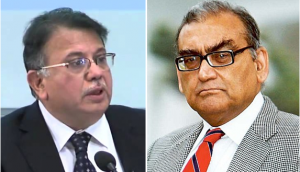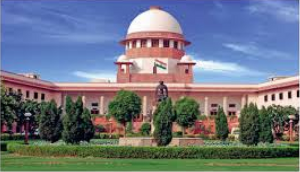The journey from Justice Hidayatullah to Justice Sathasivam
When future historians will pen the biographies of the Chief Justices of India of 1969 and 2014, they will find hard to determine the span of journey we have covered in [terms of deterioration of] our political and social values during 45 years.
By S.M.A. Kazmi
Just few days after of the formation of the new Government, its refusal to go by the recommendations of the collegium of the Supreme Court in appointing former Solicitor General of India Gopal Subramaniam as Supreme Court Judge had pitched the judiciary and the government against each other.

Justice Subramaniam’s humble maturity and Chief Justice of India Justice R M Lodha’s dignified behaviour had diluted to a great extent the possibility of any bitterness.
This has been a hotly debated topic in the media that as a Supreme Court appointee as Amicus Curie, Gopal Subramaniam’s report against Amit Shah in Sohrabuddin case had been the reason of Government’s non-cooperation. In the next few days this very collegium committee of the Supreme Court recommended the appointment of one such a legal expert who had acted as a lawyer in Amit Shah’s case. This time round Government’s immediate cooperation also remained in the news with the same fervour [as was its refusal to follow previous recommendations].
The attitude of the Government of sometimes forthwith cooperation with and sometimes sudden cold-shoulder to the judiciary has become a regular practice. During the last three days in Kerala former Chief Justice P Sathasivam and UP’s former Chief Minister Kalyan Singh—the leader of the saffron family known for his role in the demolition of Babri Mosque — in Rajasthan, have been sworn in as governors.

The similarity in both of the swearings has been that both appointments, with regard to the prestige of the judiciary, have given a cause for debatable topics.
Doctor Zakir Hussain died while he was still president of the country. Vice President V.V. Giri was installed as the acting President. Since he was going to contest the by-election for presidency he was in a dilemma whether to resign from the post of [acting] presidency or to quit as Vice President and then contest the election. Faced with this dilemma he contacted the then Chief Justice of India Mr Hidayatullah. Justice Hidayatullah in his well-known autobiography ‘My Own Boswell’ has presented the dialogue between the President and the Chief Justice verbatim.
The dignified manner, in which Justice Hidayatullah had reminded V.V. Giri of the importance of his positon and the prestige of the position of the Chief Justice, is, perhaps, not only a lesson but also a precedence that should be followed by every chief justice of India.

Referring to his friendship with Justice Hidayatullah’s late father President of the Republic V.V. Giri made an informal remark and said that after resigning as the President to be able to participate in the election for Presidency, he would want to make Hidayatullah as Acting President. Displaying rather a disinterested but extremely dignified posture Justice Hidayatullah replied, ‘You do what you want to do, the law will find its course itself.’
In his capacity as the President of the state V.V. Giri’s second question was, ‘Who should my resignation be addressed to?’ To this Justice Hidayatullah’s response was, ‘To give advice does not come within the ambit of my duties as Chief Justice of India. Therefore in this connection you should contact Attorney General.’
I am sure this famous book will have passed through the sight of Justice P Sathasivam. Had he given thought to this dialogue before accepting Governorship he would have, perhaps, displayed some reluctance. The hidden message in this dialogue would have made him realise that in the absence of President and Vice President, the Chief Justice of this country, Hidyatullah, had worked as country’s President for 40 days. This is a clear precedent and a solid proof of the fact that, as per protocol, on a non-political post, after the president and vice president, Chief Justice is the third most important personality and to confine him to the level of a state is not his promotion but will be seen as a sign of his demotion.
Mr Kalyan Singh is a convict who, in Babri Mosque demolition case, had been sentenced by the Supreme Court for contempt of court. The sectarian hatred that he was accused of leading and for which the apex court had sentenced him has neither ended and nor has he stopped leading this hatred. The proof of this came to the fore when at his swearing-in ceremony he was greeted by the slogans of ‘Jai Sia Ram’ that at the time of Babri Mosque demolition had become the hallmark of saffron family. In an interview given after taking the oath, instead of criticising his supporters and party members, with regard to this unconstitutional action he declared, ‘Expression of emotions cannot be curbed.’ In just a matter of seconds it had become clear that there has been no change between Kalyan Singh as the Chief Minister of 1992 and as the Governor of 2014.
Within 24 hours of such an appointment and such an unconstitutional incident the acceptance by a former Chief Justice of the post of a Governor of a state, under the patronage of that very saffron family and that very central government, will definitely be viewed as inappropriate if not below standard.
Judiciary is the last hope for 125 crore masses of this country. Protection of the sanctity of this institution is the responsibility more of those elites whose recognition itself is associated with this and who have been benefitting from this than the common man.
There is lot in common between Justice Markundey Katju and Justice A.P. Shah. Both have been Chief Justices of Madras and Delhi High Courts. Both have earned a mark of distinction for their extraordinary style and controversial judgements. Justice Katju has refused to accept as inappropriate the acceptance of the post of a Governor by former Chief Justice while Justice A.P. Shah has called such an appointment and the acceptance of it detrimental for the prestige and stability of the judiciary. Although both have given arguments in support of their stand, what needs to be remembered is that the question of the prestige of an institution should not be determined by logic but in the light of historical facts.
The dignified expression of disinterest by Justice Hidayatullah in Presidency and in contrast the acceptance of Governorship by Justice Sathasivam claiming that after his retirement he could not go back to his village and do farming and because he did not know anything else, is enough to prove the fact that when future historians will pen the biographies of the Chief Justices of India of 1969 and 2014, they will find hard to determine the span of journey we have covered in [terms of deterioration of] our political and social values during 45 years.
The writer is a senior Advocate and former Advocate General of Uttar Pradesh
Translated from Indquilab, 11 September 2014, by Urdu Media Monitor. Com

